In modern society there is a perception that our existence is something separate from Nature. This belief has led us to develop a deep-rooted fear of death. In turn, our fear of death has led us to see Nature as a threat to life, rather than an essential substrate for life.”
Zach Bush
DOMUS NOSTRA
To plant conscioness
The planet is in an accelerated oxidation process. Life on Earth is deteriorating at exponential rates due to the unsustainable activity of human society. The immediacy of climate change with desertification, salinization, overexploitation and environmental pollution (electromagnetic, radioactive, chemical, transgenic, food…) threatens our survival and that of future generations.
This era of mega-exploitation has led us to the destruction of our soils, water systems, oceans and human health. But we still have time to reverse the situation, to transform our planet into a green and regenerating ecosystem, as it has been, originally, for millennia.
Due to excessive globalization, humanity has lost its connection with the Earth. Although some of us still cling to it. Children spend more and more time behind screens and less time playing in the street or in the field. Children often do not know where basic foods come from or how they grow. There is a disconnection from the earth, a brutal uprooting. Planet Earth is our home and we must take care of it.
Urgent action is needed. It’s time to practice ecosophy.
This proposal vindicates the need to cultivate environmental awareness, it is a call for reconnection with the roots, with the land that provides us with food. In Mallorca, resources are scarce. The land is increasingly inaccessible, the water too.
The message of this project is to sow seeds of awareness in order to deal with the disaster we have thrown ourselves into. In order to achieve this, the artist creates an expository plastic-visual metaphor, an immersive installation that eschews simple contemplation and wants to be used as a tool for artistic mediation.
The installation consists of a family table (symbol of the community) served for 4 people. All the utensils, placed in a wooden tray. All together, covered with mud and seeds that, germinated, turn the table into a biological surface.
With this image of a plant territory, we activate the relationship between the food we consume daily and its place of origin: the countryside. And we reconfirm land and water as essential resources for the cultivation of our nutrients.
The elements of dressing and serving the table (tablecloths, chairs, mats, plates, bowls, cutlery, etc.) promote a familiar feeling, they help us identify emotionally with the installation by impulse rituals that wake us up. It’s not just a meal anymore. It is the gathering around him.
With the chairs, we invite visitors to take a seat and take a closer look at the installation. Around the table, watering cans will be placed that visitors can use to water the installation. This is, due to the desire for activation, a participatory community action.
It is also an ecological proposal: the ceramics we will produce, despite being resistant and durable, are at the same time a breathable and organic element. It is not an ephemeral art intended for a temporary exhibition where its elements end up in a warehouse. Either the wooden tray is placed in a place where it can be cared for, keeping it green as a reminder of our social commitment, or it returns to where it came from: the earth itself. And the table and chairs continue with their traditional function.
It can even be used to regenerate an urban space and open up the possibility of covering arid areas within the street network with green micro-spaces. The possibilities are multiple but their survival will depend on community commitment.
The installation was selected and shown at the Contemporary Art Festival AN Campos, Mallorca. 04.08.2023
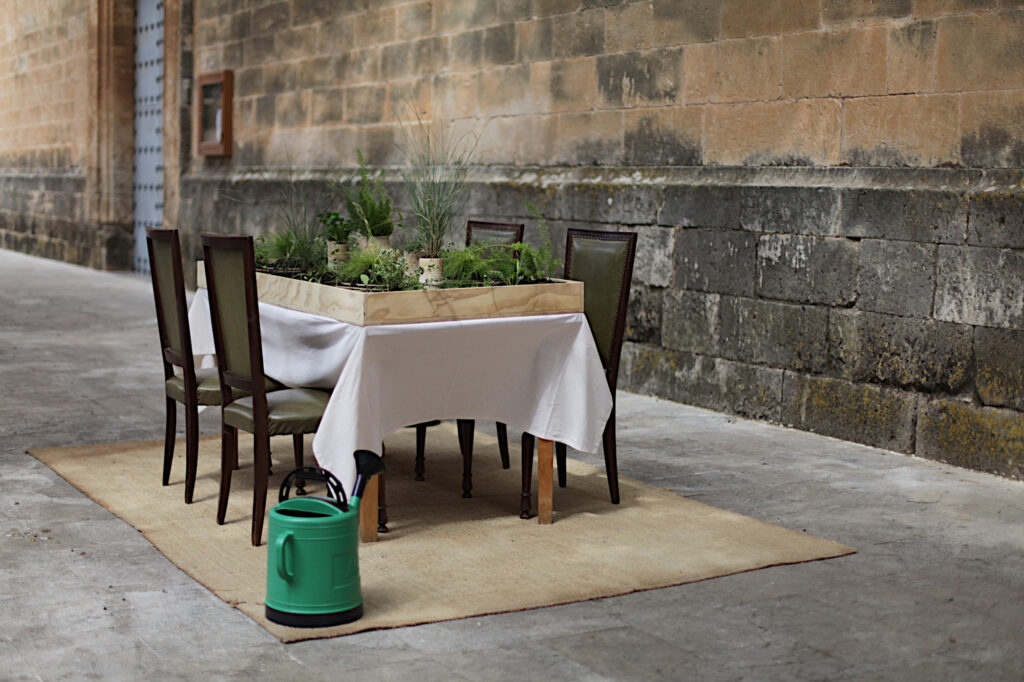

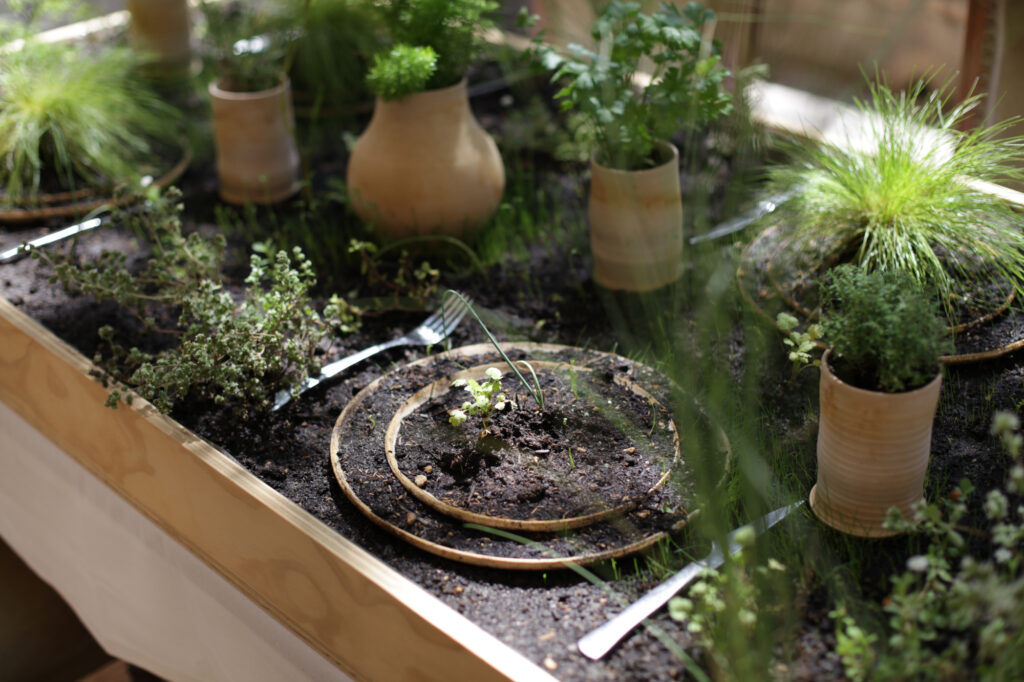
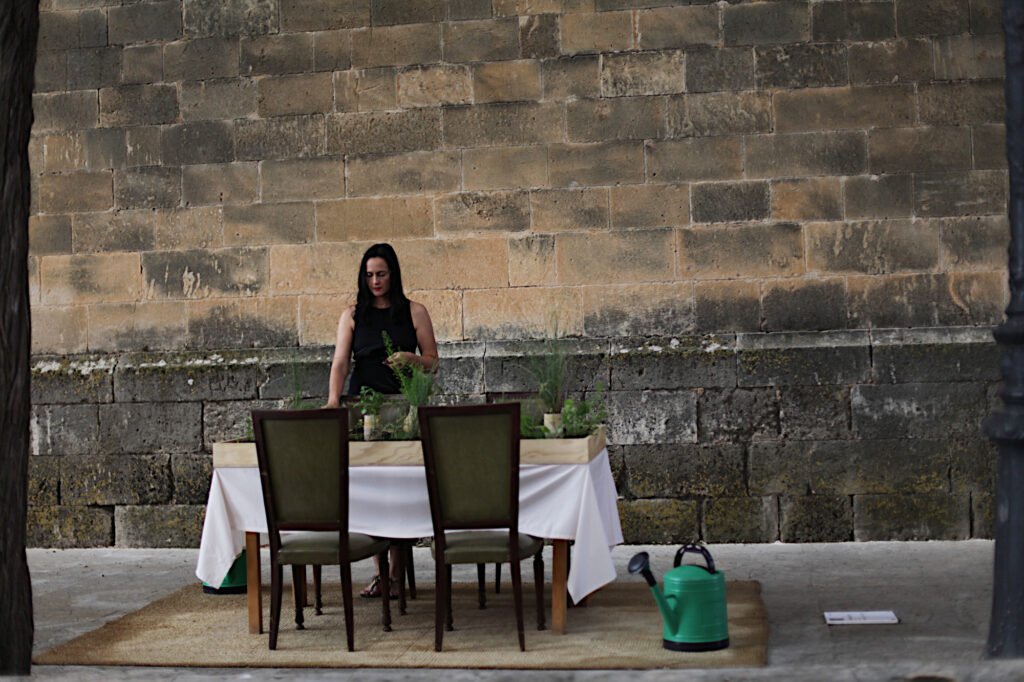
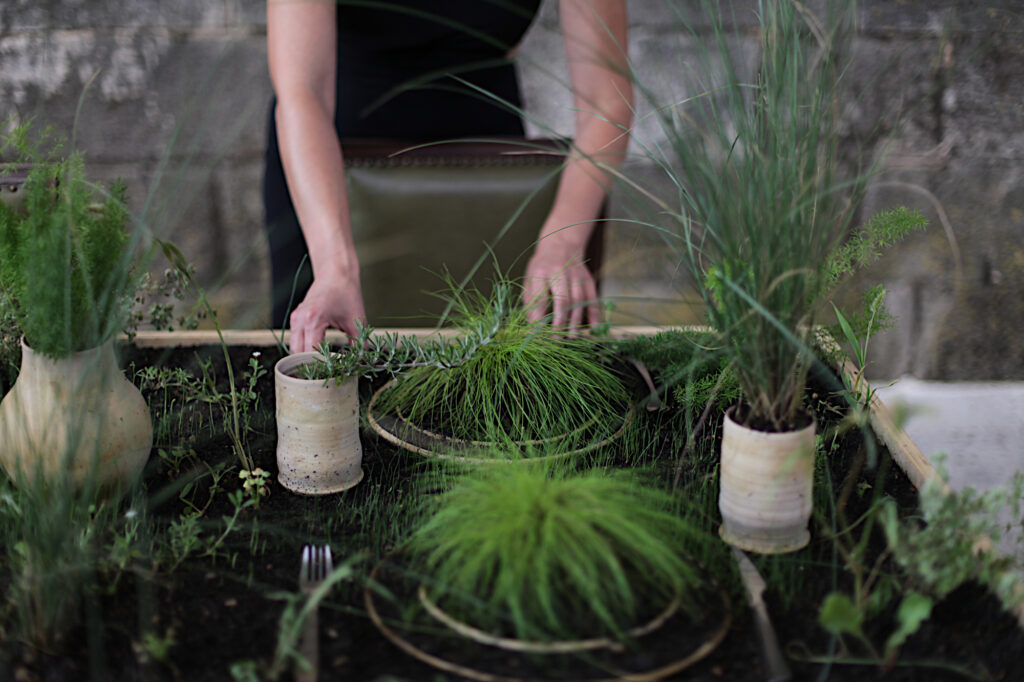
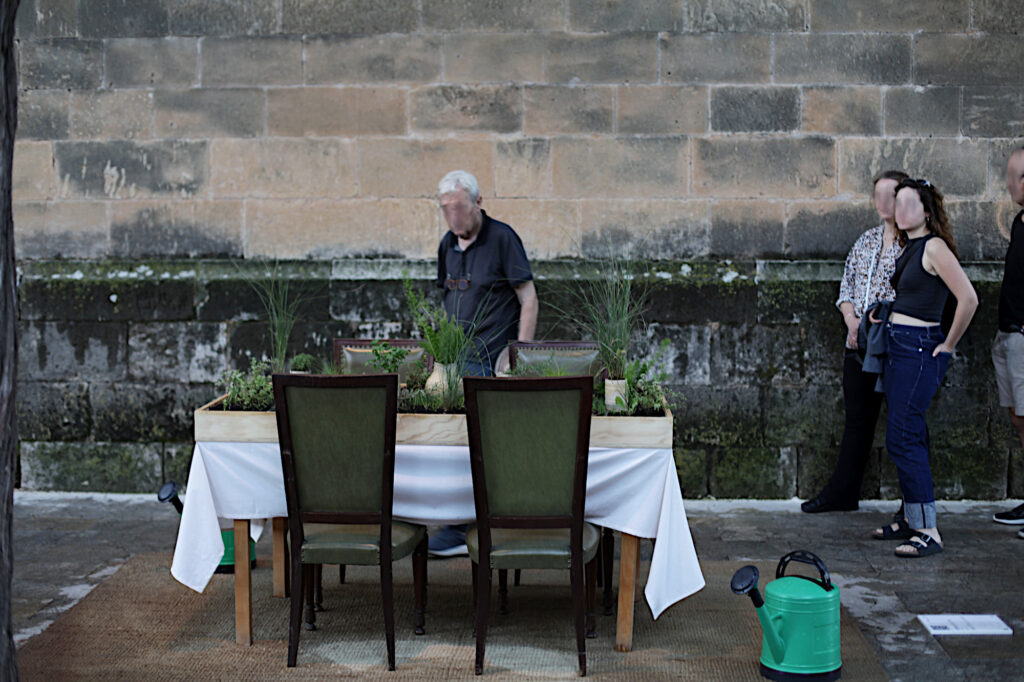

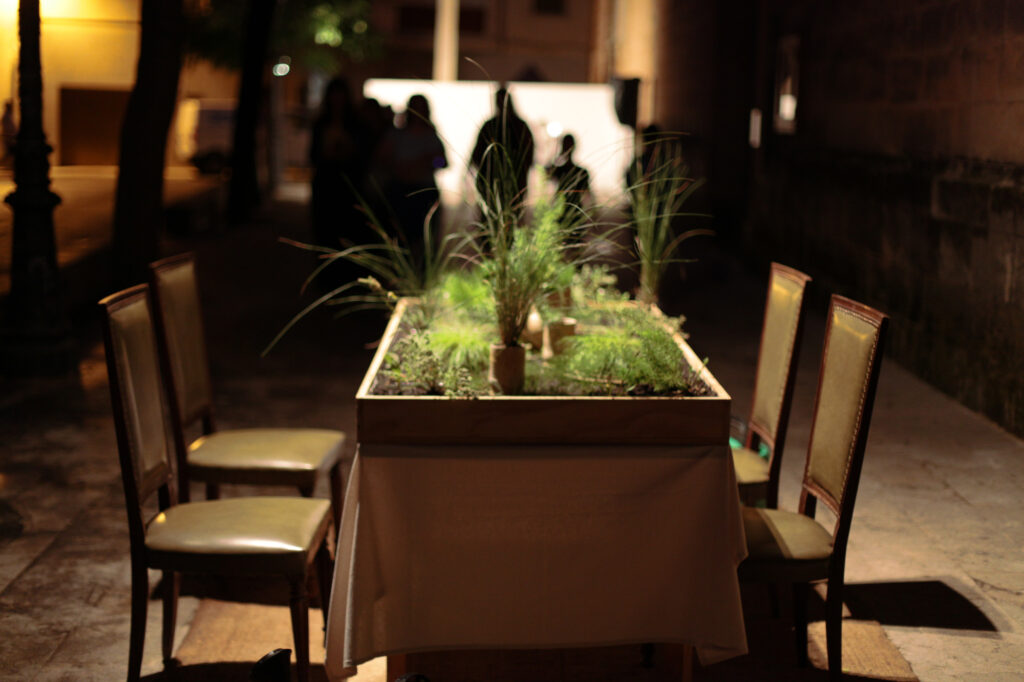
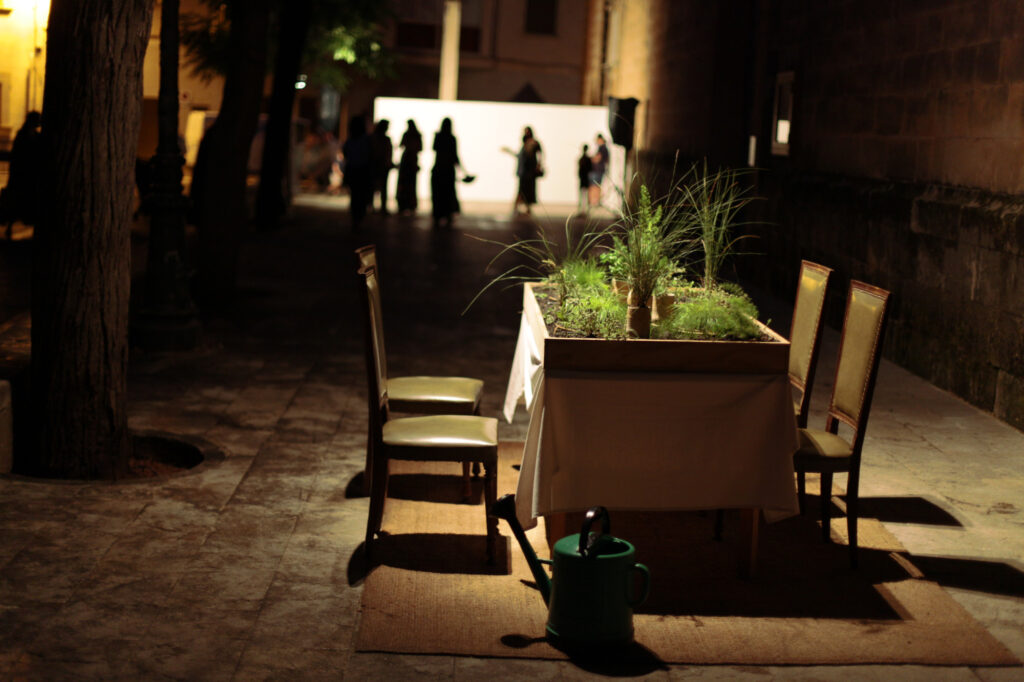

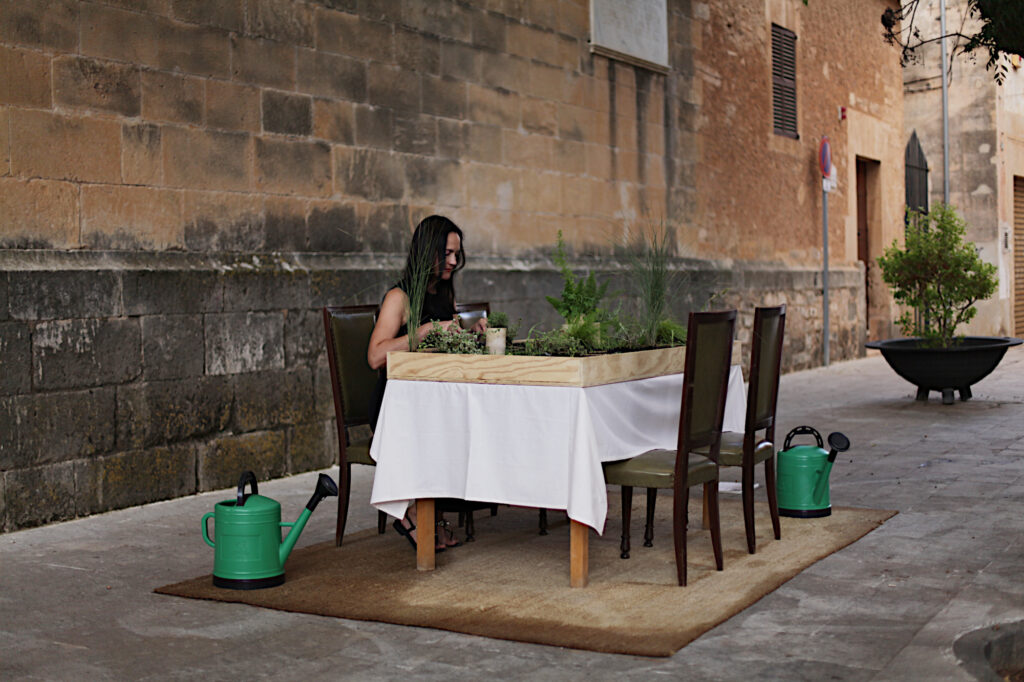
DOMUS NOSTRA
Sembrar consciència
“Dins la societat moderna existeix la percepció que la nostra existència és quelcom separat de la Naturalesa. Aquesta creença ens ha portat a desenvolupar un temor profundament arrelat a la mort. Al seu torn, la nostra por a la mort ens ha portat a veure la Naturalesa com una amenaça per a la vida, en lloc d’un substrat essencial per a la vida.”
Zach Bush
El planeta es troba en un procés d’oxidació accelerat. La vida a la Terra es deteriora a ritmes exponencials a causa de l’activitat insostenible de la societat humana. La immediatesa del canvi climàtic amb la desertització, la salinització, la sobreexplotació i la pol·lució ambiental (electromagnètica, radioactiva, química, transgènica, alimentària…) amenaça la nostra supervivència i la de generacions futures.
Aquesta era de mega explotacions ens ha conduït a la destrucció dels nostres sòls, dels sistemes hídrics, dels oceans i de la salut humana. Però encara som a temps de revertir la situació, de transformar el nostre planeta en un ecosistema verd i regenerador, tal com ho ha estat, originalment, durant mil·lenis.
A causa de la globalització desmesurada, la humanitat ha perdut el vincle amb la Terra. Tot i que alguns encara ens hi aferram. Els infants passen cada vegada més temps rere les pantalles i menys temps jugant al carrer o al camp. Els nins moltes vegades no saben ni d’on venen ni com creixen els aliments bàsics. Hi ha una desconnexió de la terra, un desarrelament brutal. El planeta Terra és casa nostra i l’hem de cuidar.
Cal una actuació urgent. És hora de practicar l’ecosofia.
Aquesta proposta reivindica la necessitat de cultivar la consciència mediambiental, és una crida per la reconnexió amb les arrels, amb la terra que ens proporciona els aliments. A Mallorca, els recursos són escassos. La terra cada cop és més inaccessible, l’aigua també.
El missatge d’aquest projecte és sembrar llavors de consciència per tal de fer front al desastre on ens hi hem abocat. Per tal d’aconseguir-ho, l’artista elabora una metàfora plàstico-visual expositiva, una instal·lació immersiva que defuig de la simple contemplació i que vol fer servir d’eina de mediació artística.
La instal·lació consta d’una taula familiar (símbol de la comunitat) servida per a 4 persones. Tots els utensils, col·locats dins una safata de fusta. Tot plegat, cobert de fang i llavors que, germinades, fan de la taula una superfície biològica.
Amb aquesta imatge d’un territori vegetal activam la relació entre els aliments que consumim diàriament amb el seu lloc de procedència: el camp. I reconfirmam la terra i l’aigua com a recursos imprescindibles per al cultiu dels nostres nutrients.
Els elements de vestir i servir la taula (les estovalles, les cadires, l’estora, els plats, els bols, els cuberts, etc) propicien la sensació familiar, ens ajuden a identificar-nos afectivament amb la instal·lació per la pulsió ritualística que ens desperten. Ja no és només un àpat. És la reunió al seu voltant.
Amb les cadires, convidam els visitants a prendre seient i a contemplar la instal·lació de més aprop. Al voltant de la taula es col·locaran regadores que els visitants podran emprar per a regar la instal·lació. Aquesta és, per la voluntat d’activació, una acció participativa comunitària.
Es tracta també d’una proposta ecològica: la ceràmica que elaborarem, tot i ser resistent i duradera, és alhora un element transpirable i orgànic. No és un art efímer destinat a una exposició temporal on els seus elements acabin en un magatzem. O bé la safata de fusta s’emplaça a un lloc on pugui ser cuidada, mantenint-la verda com a recordatori del nostre compromís social, o bé torna allà d’on ve: de la terra mateixa. I la taula i les cadires, continuen amb la seva funció tradicional.
Pot fer-se servir fins i tot per a regenerar un espai urbà i obrir les possibilitats de cobrir de microespais verds les zones àrides dins de l’entramat de carrers. Les possibilitats són múltiples però la seva pervivència dependrà del compromís comunitari.
La instal.lació va ser seleccionada i mostrada al Festival d’art contemporani AN Campos, Mallorca. 04.08.2023
НАШ ДОМ
Сеять оcoзнанocть
«В современном обществе бытует мнение, что наше существование есть нечто отдельное от Природы. Эта вера привела нас к развитию глубоко укоренившегося страха смерти. В свою очередь, наш страх смерти привел к тому, что мы стали рассматривать природу как угрозу жизни, а не как необходимый субстрат для жизни».
Зак Буш
Когда-то человек решил, что он царь природы и все вокруг принадлежит ему. Но быть владыкой означает не только иметь и использовать, но в первую очередь — оберегать и нести ответственность.
Почему же человек относиться к природе так потребительски, без должного уважения и благодарности?
Вырубка леса, утилизация отходов в почве, истощение природных ископаемых, загрязнение воды, разрушение озонного слоя, перенаселение планеты, электромагнитное, радиоактивное, химическое, трансгенное загрязнение окружающей среды — все это ведет к значительному ухудшению экологической ситуации в мире, ставя под угрозу выживание всего живого на нашей планете.
Из-за чрезмерной глобализации человечество потеряло связь с землей. Дети проводят все больше и больше времени дома за экранами гаджетов и все меньше играют на улице. Зачастую они даже не знают, откуда берутся основные продукты питания, как они произрастают.
Но у нас еще есть время все исправить, превратить нашу планету в зеленую и регенерирующую экосистему, какой она была на протяжении тысячелетий. И для этого необходимы срочные действия.
Планета Земля – наш дом, и мы должны заботиться о нем.
Данная Инсталляция демонстрирует необходимость культивирования экологического сознания. Это призыв к воссоединению с корнями, с землей, которая дает нам пищу.
Послание данного проекта состоит в том, чтобы посеять семена осознанности, иначе нам не справиться с бедствием, в которое мы сами себя вовлекли.
Художник Анастасия Егорова представляет экспозиционную пластически-визуальную метафору — иммерсивную инсталляцию, которая создана вовсе не для простого созерцания, а как интерактивный художественный объект.
DOMUS NOSTRA
Инсталляция состоит из семейного стола, сервированного для 4 человек, который символизирует наше общество. Посуда размещена на деревянном подносе. Все вместе покрыто землей и семенами, которые, прорастая, превращают стол в биологическую поверхность.
С помощью этого образа художник показывает связь между пищей, которую мы ежедневно потребляем, и местом ее происхождения — почвой. А также обращает наше внимание на то, что земля и вода являются важными ресурсами для выращивания продуктов питания.
Элементы декорирования и сервировки стола (скатерти, стулья, тарелки, стаканы, столовые приборы и т. д.) погружают нас в привычную атмосферу, знакомый ритуал. Это уже не просто еда. Это сообщество людей за одним столом.
Также вы здесь найдете экологическое послание: керамика, которую мы будем производить, несмотря на то, что она прочная и долговечная, в то же время является воздухопроницаемым и органическим элементом.
Анастасия Егорова приглашает посетителей сесть на стулья и поближе познакомиться с инсталляцией. Вокруг стола будут расставлены лейки, из которых посетители смогут поливать инсталляцию. Таким образом художник стремиться вдохновить общество на совместные действия.
Это не эфемерное искусство, предназначенное для временной выставки, после которой все его элементы будут отправлены пылиться на склад. Стол и стулья продолжат выполнять свою традиционную функцию.
А деревянный поднос либо поместят в место, где о нем можно заботиться, сохраняя его зеленым как напоминание о наших социальных обязательствах. Например, использовать в качестве зелёного микропространства на одной из засушливых улиц. Либо он вернется туда, откуда пришел: в саму землю.
Возможностей много, выбор будет зависеть от желания и осознанности сообщества.